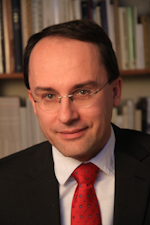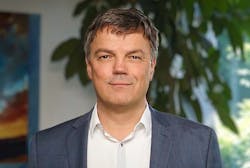Starting a quantum business in pandemic times—An interview with Thomas Laurent
As the global lockdown eases and more-normal business resumes, Thomas Laurent, one of the founders of laser-diode maker eagleyard Photonics, has joined Scottish laser company M Squared and is setting up the German office in Berlin (see Fig. 1). Andreas Thoss talked to him about the excitement and challenges of ramping up a quantum technology business in these times.
Andreas Thoss: Thomas, what exactly are you doing for M Squared?
Thomas Laurent: I accepted the position on the first of May. My role will be divided into the sales management for Germany, Austria, and Switzerland on one hand, and site management on the other. I am ramping up the organization here in Berlin, and this is much like creating a business, but with more financial and organizational resources. It starts with an empty office, and I'm responsible for setting up the appropriate infrastructure and a new team. The plan is to get all things up and running within the next nine months.
AT: How has M Squared been dealing with COVID-19?
TL: The COVID crisis has had a major impact in the UK, which we as Germans cannot really imagine. M Squared is taking this very, very seriously and, therefore, the priority was to follow the governmental guidance. First of all, M Squared had to bring home any staff that were abroad. That was not so easy, but we returned everyone home safely.
The lockdown has proved to be highly disruptive for many, but M Squared has adapted at pace. Our existing agile framework has translated well into planning projects and we have continued work virtually—our daily standup meetings moved to Zoom, and we've made great use of several other collaborative technologies. Even a weekly full team meeting is held online. Having around 100 people in such a session is challenging, but it retains the spirit of the company.
For jobs such as manufacturing, we immediately made changes to our facilities. We staggered working hours, introduced social distancing, and left the minimum crew on site, in sanitized rooms, who then continued production according to the order backlog.
AT: How do you assess the situation in the market for quantum technologies?
TL: Quantum technology (QT) is a rapidly emerging field and still growing. Indeed, the German government has just recently announced another 2 billion Euros in funding for QT.
M Squared has established itself as a cornerstone of the emerging UK supply chain for QT. Through investment and collaboration, M Squared has built a dedicated quantum division responsible for demonstrating several UK quantum firsts, including the first commercial quantum gravimeter and the first commercial quantum accelerometer (see Fig. 2).
The market for QT is currently mainly driven by government programs. M Squared joined this market in the UK quite early and we had a chance to establish supply chains, which will be very helpful when more industrial applications take off.
The good news is that there is no commoditization yet. Every item must be custom-built. This requires a lively exchange of ideas and fully trained product specialists who understand the customer's needs, the application, the experiment behind it, and of course the commercial background. We join a project most often in the phase of funding application.
AT: What about industrial applications?
TL: As I said, so far QT is a government-initiated market. Investments have been spawned worldwide through government programs. And there, we see competition because it is a competition between regions of the world.
Industrialization of quantum technologies is the next step—I think we will see that within the next 10 years. We will see bigger installations of QT, which require further miniaturization and standardization.
Personally, I expect a symbiosis between space activity, near-Earth satellite communication, and quantum technologies. Quantum key distribution could be a safe way for satellite-to-ground communication, and through this there is a chance to establish the first large-scale applications.
AT: How do you expect QT to unfold in 10 years?
TL: Unfolding is a good expression, since it stands for growth with a moderate speed. We are just at the beginning and actually QT is ready to gain momentum after the pandemic. The new stimulus package of the German government has a total volume of 130 billion Euro. It includes several investments in technology, including the 2 billion for QT.
And even in times of the pandemic, where short-term work or industrial dislocation is prevalent, investment decisions are still being made in certain technologies that will eventually drive the demand for quantum and photonics technology.
AT: How will Brexit influence your business?
TL: It is a fact that poses a challenge and we must deal with it. But we are familiar with changing situations because of the scientific environment in which the company operates. We are used to analyzing and finding a solution accordingly.
We will try to keep the distance between Dover and Calais short, and the relations tight. We have started operations here in Berlin, not only with a commercial and technological agenda, but also with a quantum politics agenda. After all, we still depend on the actual terms that are currently under negotiation in Brussels.
I think we have taken the right measures to secure the business firsthand by establishing the German office. One intention is to maintain the supply chain in Europe. The other is to guarantee sales and also after-sales support. These are the right measures.
AT: What is it like for you, as a Berliner, to set up a branch office here for a British company?
TL: There is much déjà vu. Setting up a subsidiary for a company is not much different from founding a startup as we did in spinning-off from a major institute here on the Adlershof campus in Berlin. It too starts with an empty room. The main difference is with the people—I have met many partners, clients, and even competitors who have helped me establish the new operation.
I think it was a perfect decision to locate the company here in Berlin. That is not because I am a Berliner—the decision was made before I joined the company—but because Berlin has an essential number of scientific institutions and small- and medium-sized companies. Many of them are also in walking distance.
I believe we have about 140 photonics companies here on the campus. They are indeed responsive, and the collaborative idea is convincing, even if we are considered competitors. That is what makes this location so attractive.
AT: How long does it take to set up a company here?
TL: For one thing, the site managers compete within the city and help you from the start with the little things you need. And then there are things you cannot speed up, such as establishing a limited liability company. With all the paperwork, this takes 10–12 weeks.

Andreas Thoss | Contributing Editor, Germany
Andreas Thoss is the Managing Director of THOSS Media (Berlin) and has many years of experience in photonics-related research, publishing, marketing, and public relations. He worked with John Wiley & Sons until 2010, when he founded THOSS Media. In 2012, he founded the scientific journal Advanced Optical Technologies. His university research focused on ultrashort and ultra-intense laser pulses, and he holds several patents.
